I often hear people say that Cantonese is a very difficult language to learn, and that there are not much resources available. There are certainly challenges to overcome, but they are not as insurmountable as one might sometimes think.
Here is the inspiring story of Paul Bodenham, a British man who started to learn Cantonese over four decades ago, in a time before internet and apps and the number of resources we have available to us today. He is now rather fluent in Cantonese. (He rates his Cantonese fluency 8 out of 10, and I have seen some of his Cantonese writing on Facebook and I agree with that assessment. You can see samples of his writing further down this page.). I had reached out to him to share his story after reading one of his comments on a Facebook post that he spent nearly a week’s wages to buy a Cantonese dictionary in 1977.
Paul was born and brought up in London where he still lives. Most of his working life has been spent in the hospitality industry. He has been married to his Hong Kong born wife since 1987 and they have 2 daughters.
How it began
I cannot remember a time when I was not interested in China; her culture and her languages. My earliest memory must be from when I was 5 or 6 years old. My primary school had a display of Chinese artefacts: clothes, bowls, chopsticks, parasols etc. These all captured my imagination BUT it was the paintings and above all the newspapers and books on display that did something to me. I remember standing in front of the newspaper and pretending to read it ALOUD.
Moving forward a few years, I would copy Chinese characters from the names of restaurants. Sometimes using English words to help me remember. Eg: The Cantonese word for door( 門mun) was similar in pronunciation to the English word Moon, the word for new (新 san) sounded like the English sun etc. (This word association was reversed many years later when my mother in – law associated the Cantonese for turn off the light (熄燈 sik dang) for the English sit down.)
In the early 1970’s when I was at my Secondary school, there was a group of new arrivals from Hong Kong. I quickly made friends with them and they taught me a few words.
Early days of Learning Cantonese
My Cantonese journey truly began once I had left school. In those days there was no internet, so there were truly very few resources for learning Cantonese.
I bought a copy of ‘Teach yourself Cantonese’ ( this was the original R Bruce edition) and, in London’s China Town I found a small book entitled ‘A Guide to Cantonese(粵語指南). This book had the contact details of the author and I contacted him to buy the accompanying cassette and a copy of ‘The Student’s English Cantonese Dictionary from Hong Kong.
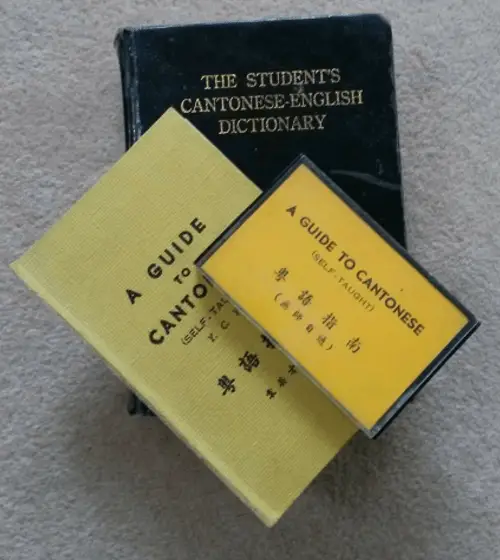
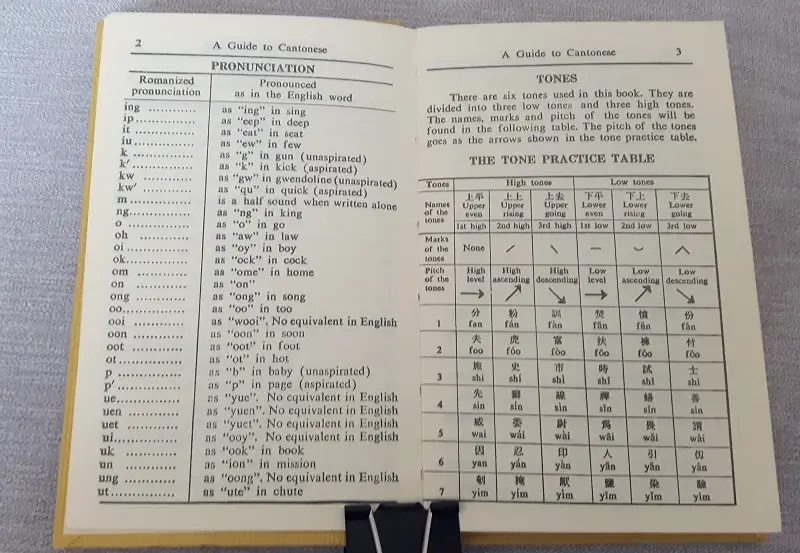
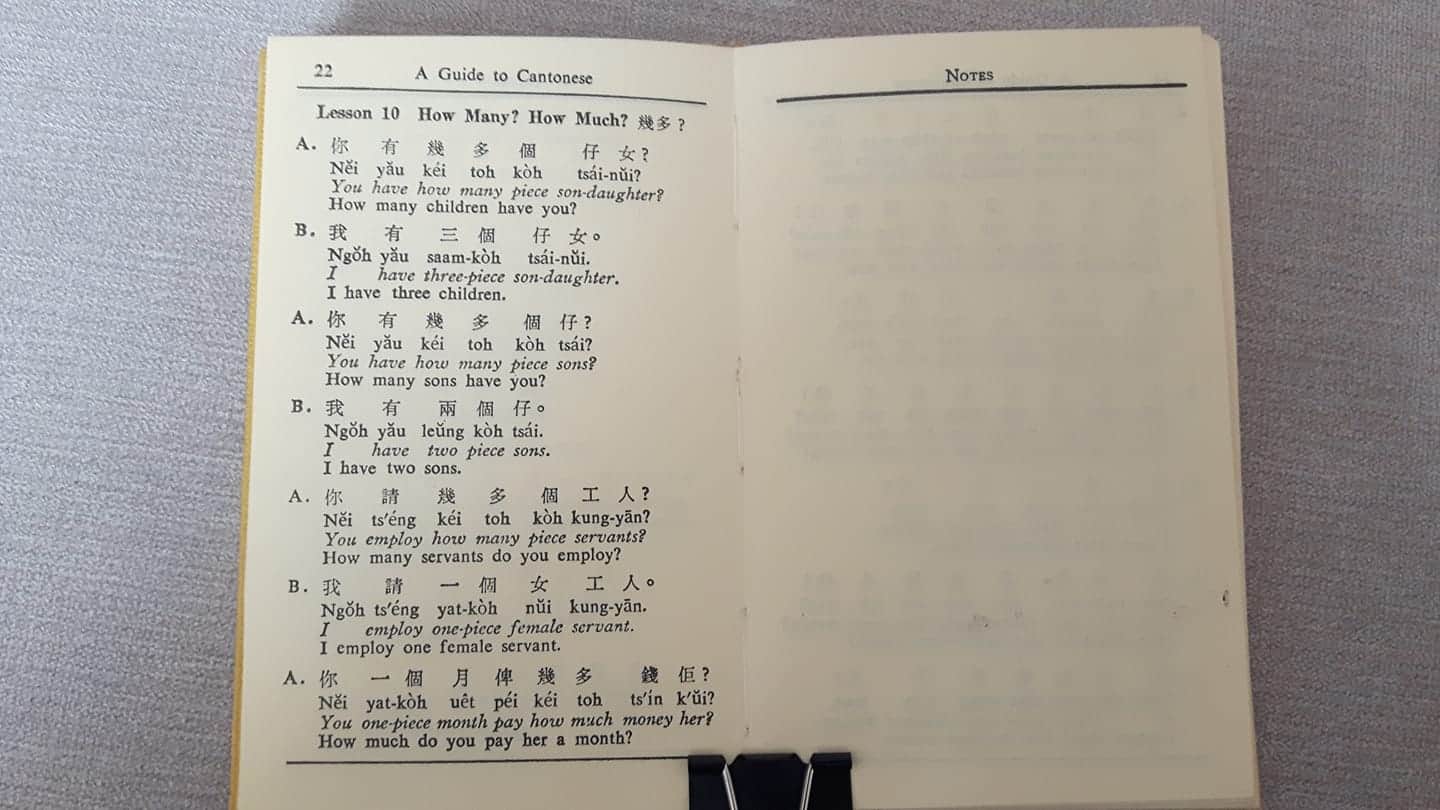
The dictionary alone cost me well in excess of a week’s wages back then BUT was well worth every penny. (This was in the 70s)
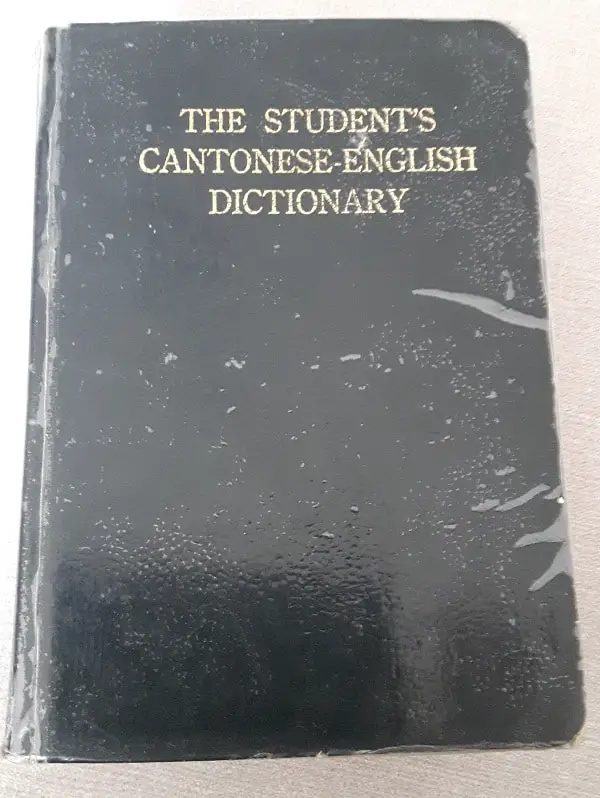
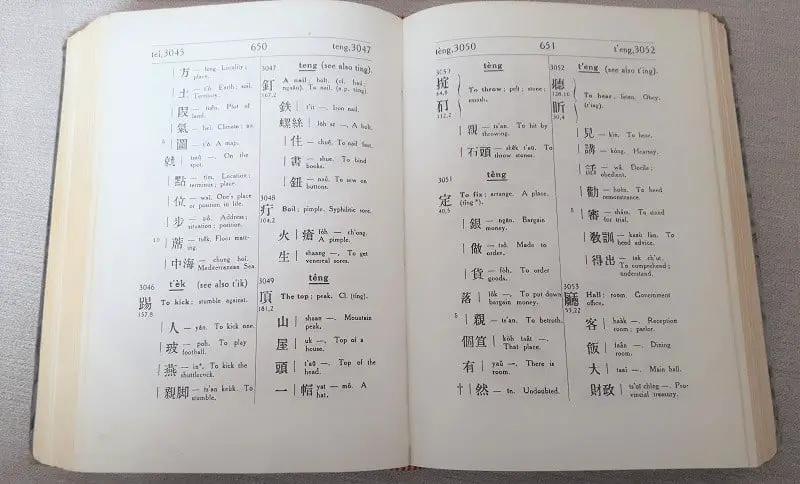
In addition, I would buy cassettes of Cantonese songs and especially of Cantonese Operas as they all contained the lyrics and libretto, a chance to hear the sounds of the language. A couple of years later, I managed to find the (at that time) only Cantonese evening class available in London at the time and signed up. The course used the Speak Cantonese Textbooks using the Yale System.
At the same time I would trawl through bookshops in an effort to find other material. I found some random books including 高級粵語課本 Advanced Cantonese 1 and 2 by Sydney Lau.
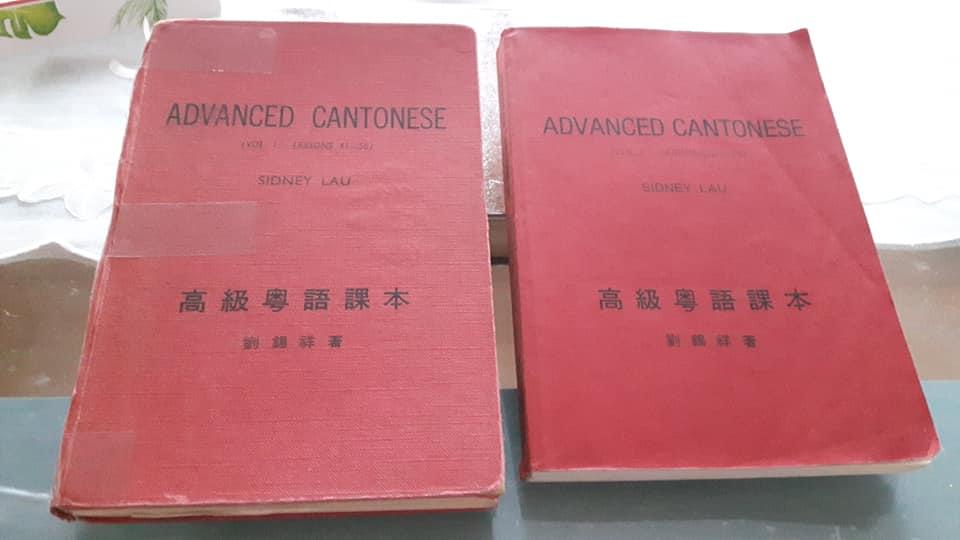
A Personal Connection
All through this period I would venture to friends’ homes, London’s Chinatown and try and practice. I made penfriends in Hong Kong and in 1980 took my first trip there. Friendships that remain to this day. Also around this time I started to watch Cantonese films and later on to hire videotapes of HK TV programmes. These were all good listening practice.
Since those far ago days, I have become more and more fluent.
Through my wife (whom I met later on ), I now have family connections with a Cantonese speaking family. We make regular trips to Hong Kong; where the learning of new vocabulary continues.
Family Support
I grew up in an English-speaking household. When I started to pick up Cantonese my family, especially my mother, was very supportive. She felt very proud when she heard me speaking Cantonese. It was she, who surprised me by paying for my initial trip to Hong Kong in 1980! Even my grandmother used to tell people I was very good at speaking ‘foreign’
I already spoke quite a bit of Cantonese by the time I met my wife. She has always been happy that I have been able to communicate with her family. She does sometimes regret it when she realises she can’t gossip too much with friends when I’m around.
Bilingual Parenting
We have raised our 2 daughters to be bilingual. Something that was important and so natural to us both. My wife would use ONLY Cantonese and I, ONLY English. Many of our friends (mixed couples amongst them) kept saying that it would confuse them IT DIDN’T! They would however code switch for words they didn’t know for the corresponding word in either language. I remember with my eldest daughter that one day telling me that she had to “chaat ( 刷 brush) her teeth”.
I remember too that on an occasion my wife asked my daughter to tell me what happened to her earlier that day. She proceeded to tell me that she had fell out of bed and bumped her head. I asked her to tell Mummy what had happened and without any hesitation she said the same thing over again this time in Cantonese.
Both our daughters attended Chinese school on Saturday. While music lessons or joining clubs etc was optional… Chinese school wasn’t. They are both grown up now and can see the benefits. My eldest went (back) to Hong Kong for 3 years and worked as an HR PA in an international school and was many times a bridge between the expat teachers and the local staff. If we hadn’t encouraged them to be bilingual, this certainly wouldn’t have been the case.
Regarding how my children view speaking Cantonese now as compared to when they were younger – Well, they are both fluent but my eldest finds it easier to communicate in Cantonese. My younger daughter will hear a sentence, mentally compute it, translate and then the Cantonese would emerge. Just a momentarily time lapse.
When she was younger however, the time lapse was a bit longer. This caused her upset as some people (especially her aunts/ uncles) would speak slowly / ask did she understand? Or worse… ask my wife, didn’t she speak to her Cantonese? My daughter would say no I don’t understand… this set her against speaking Cantonese and she didn’t enjoy her time at Chinese school.
Encounters with other non-native speakers
Once a relative of my wife’s came to UK on a trip with some friends. Among the group was their adult teacher (an American), we picked them up from the airport and I remarked how weird it was for me to be speaking to a non-Chinese person in Cantonese. Have also met missionaries in Hong Kong who spoke fluent Cantonese.
Further Studies
In later years again… I studied and gained formal qualifications both GCSE and A Level Chinese taught through Cantonese. I don’t know what prompted me to continue my studies to exam level. Perhaps I thought at one point that I would use my language in a work environment; although the main reason I learnt Cantonese for my own pleasure.
Media Consumption and Fluency
Regarding my level of fluency, I would say that I am approximately 80+% fluent. As when children learn to speak, it is comprehension that precedes oral. There are times when although I can follow/ understand a conversation, there are gaps in vocabulary. I have noticed too that there are times; especially at ‘noisy’ gatherings where the language just ends up a ‘white noise’ and I zone in and out. I’m sure this isn’t unique to me and my relationship with Cantonese. My wife has experienced the same in English.
With media, comprehension of both radio broadcasts and TV programmes in general are fine. News however is sometimes hard to follow, I think there is a lot of stylised language used in news bulletins. Same would be true for anything that uses specific to the job vocabulary ( legal, medical etc).
Having studied the standard written language initially at the night classes, I am comfortable in reading books, newspapers or magazines. I found at the beginning to read translations of books I’d read in English was a great help as I would already know the story lines so was just a case of vocabulary building. I used to regularly write letters to my HK friends, and as such had practice at putting my thoughts down on paper.
I don’t watch much HK TV these days. I like to watch old b/w movies 粵語長片.
Examples of Writing Practice
I have just gone through my old briefcase and , and found some examples of my writing,
from the first characters….
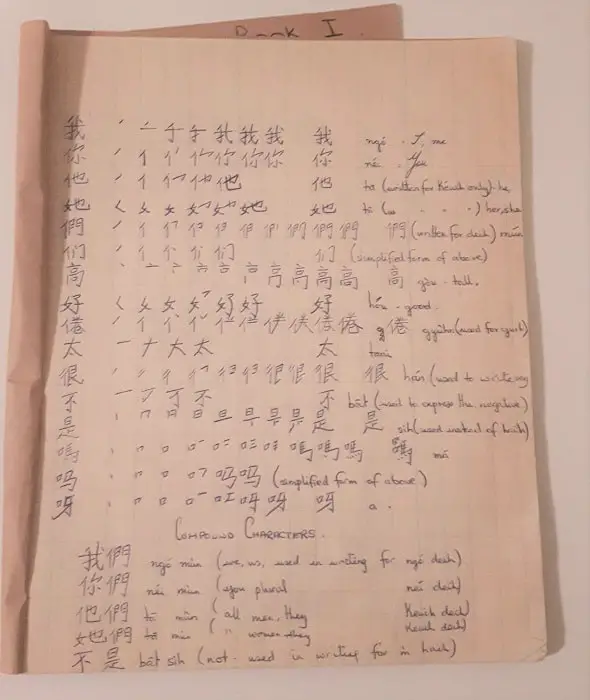
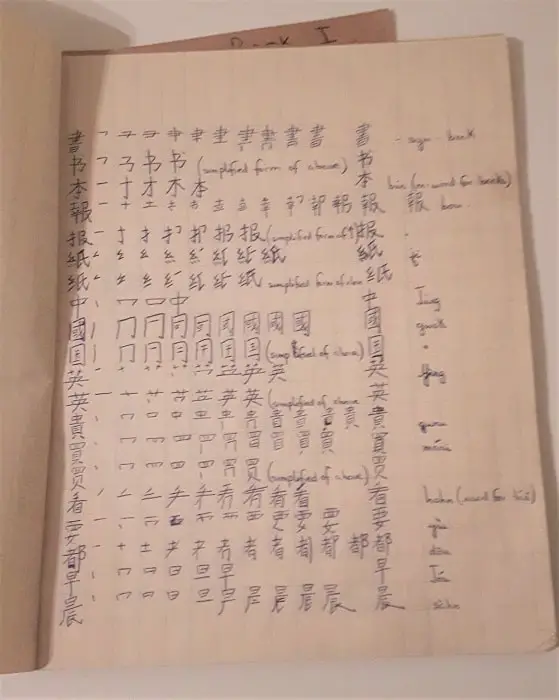
to a romanized text I put into characters.
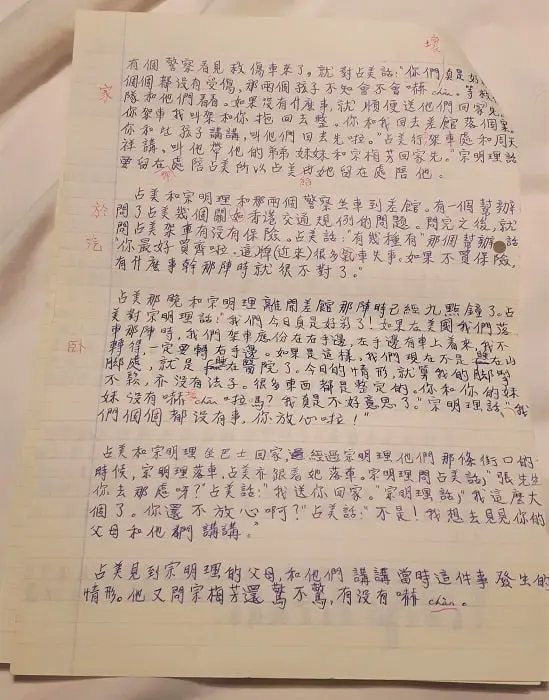
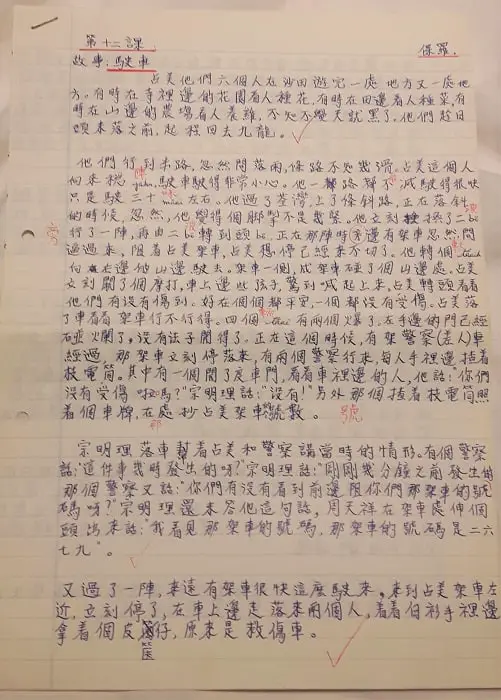
Other languages:
You asked if another language also interested me since. Simple answer is yes! Modern Greek. That is another long long story but in short – I went on holiday to Greece, and once there, I was bitten again by the language bug. Went through a similar pattern ( teach Yourself book,..few private lessons and eventually found a Greek Community school near to my home that offered an adult class. Been through 3 teachers and helped promote the adult group. Took GCSE exam and am now a TA ( teaching assistant) with the reception class ( 5/6 year olds).
Thoughts about Cantonese
In conclusion I would like to say that having a knowledge of Cantonese has been a great asset to me, giving me lifelong friendships and opening doors to a culture and way of life that would have otherwise remained if not firmly closed then definitely only half open. Cantonese is a truly rich and vibrant language and, in my opinion, (some may disagree) Cantonese IS A LANGUAGE in its own right NOT just a Chinese dialect.
Advice / tips for Cantonese learners
- One thing I would say to a learner is not to be put off by what people say / laugh at you. You are learning and it may be hard ay first but the old saying practice makes perfect is true or as the Cantonese say 一次生兩次熟 ( yat chi saang leung chi suhk)
- Listen to the language as much as possible. Don’t try to understand too much, (if anything) it is enough to let the language wash over you . Absorb the sounds and rhythm. Eg: internet radio is a good place. We regularly listen to plays on RTHK. Which has just suddenly prompted me to think back to my early days. Listening to a Cantonese Opera. At one point there was a someone knocking on a door and saying 開門呀! (hoi mun a!) So I picked up that is how to say “open the door”. Which obviously followed on with 入嚟呀(yap leih a) come in.
- Keeping motivated: Finding new words and expressions. Taking every opportunity to use the language.
Many thanks to Paul for sharing his journey. He has proven the adage that when there is a will, there is a way. I hope this will inspire many of you out there who are learning Cantonese, or seeking to improve your Cantonese. There are so many resources out there today, both free and paid, that we are actually spoilt for choice. (Just surf around this website for lots of links to free resources). Paul has shown us that if you have determination, dedication and discipline, even a 52 page book is sufficient to start your journey.
You might also be interested in reading:
- Free Online Cantonese Literature
- What You Need To Know About Cantonese: the Vernacular and the Formal
- Cantonese Flashback: Readings In Cantonese Colloquial (1894)
- Colours in Cantonese 顏色(粵語): Vocabulary lists and worksheets
- Online Colloquial Cantonese Phrase Lists
- Free Online Resources for Learning Cantonese
- 83 Cantonese Proverbs in One Illustration
- How to Create a Cantonese-Rich Environment
Photo credits: Featured photo collage made with photo by Nicholas Sampson on Unsplash and photos by Paul Bodenham. All other photos by Paul Bodenham.

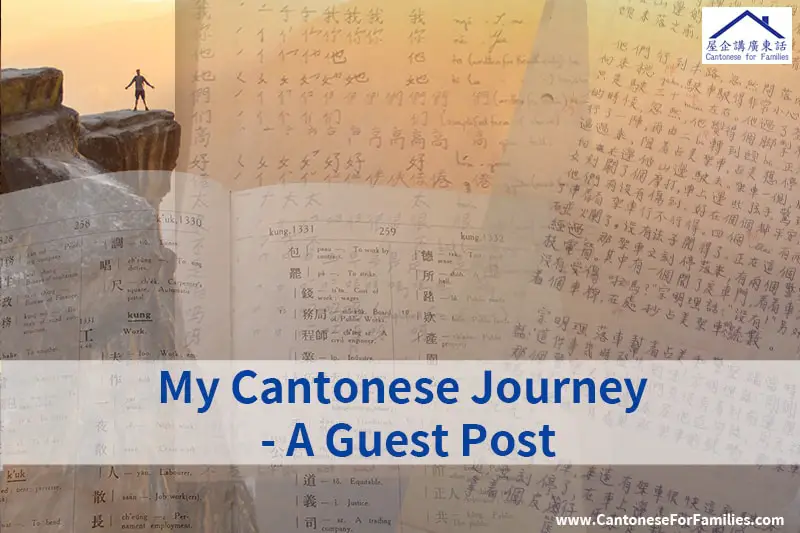
Love your works !!
Thank you!